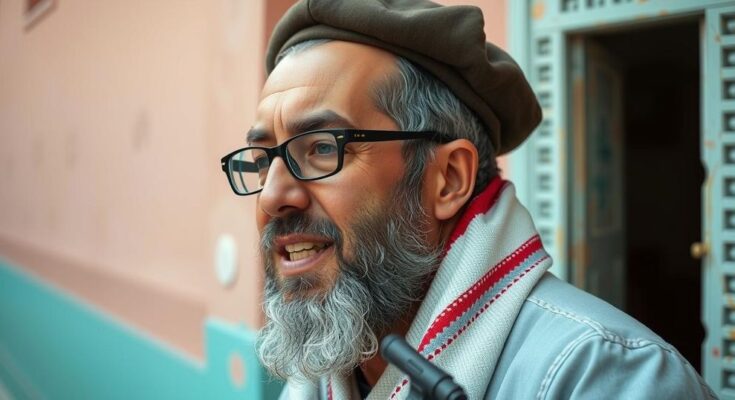Said Ait Mahdi, a Moroccan activist, was sentenced to three months in prison for defamation due to his criticism of the government’s earthquake response. His group advocates for victims of the 2023 El Haouz earthquake, where thousands suffered. Ait Mahdi plans to appeal the ruling, sparking discussions on freedom of expression in Morocco.
A prominent Moroccan activist, Said Ait Mahdi, was sentenced to three months in prison on charges of defamation for his comments regarding the government’s response to the 2023 El Haouz earthquake. Ait Mahdi, the leader of an advocacy group for earthquake victims, has been in custody since December 23 and will also be required to pay 10,000 dirhams (approximately $1,000) in damages to each complainant. While three other members of his group were acquitted of insulting public officials, the ruling was made in connection with complaints from local officials about posts Ait Mahdi allegedly made on social media.
The El Haouz province was severely affected by a devastating 6.8 magnitude earthquake in September 2023, leading to nearly 3,000 fatalities and significant property damage, with around 60,000 homes destroyed. In the wake of this disaster, many survivors have struggled through winter living in temporary shelters. In December, Moroccan authorities reported that more than 57,000 reconstruction permits had been granted, with over 35,000 homes either completed or underway, in a government initiative allocating approximately $11 billion to aid recovery efforts across the impacted areas.
Said Ait Mahdi’s advocacy group has been instrumental in pushing for prompt reconstruction and increased assistance for the earthquake-affected communities. Following the conviction, Ait Mahdi’s legal counsel, Mohamed Nouini, announced intentions to appeal the verdict, asserting that such rulings have implications for freedom of expression in the country. The situation is under scrutiny, illustrating the tensions between government accountability and civic dissent in Morocco, particularly following natural disasters.
“Ait Mahdi intends to appeal the ruling,” stated lawyer Mohamed Nouini, emphasizing the ongoing struggle between advocates for victims and local authorities.
In conclusion, the sentencing of Said Ait Mahdi highlights significant concerns regarding freedom of expression and governmental accountability in Morocco, particularly in the context of natural disasters. This case may have broader implications for civil rights and activism in the country, as advocates continue to press for reforms and adequate responses to be made post-disaster.
The case of Said Ait Mahdi emerges in the aftermath of the 2023 El Haouz earthquake that devastated parts of Morocco, causing significant loss of life and property. Following the earthquake, the Moroccan government rushed to implement a reconstruction plan, but critics noted insufficient support for the victims. Ait Mahdi’s comments targeted the delays and inadequacies in the government’s response, conveying public frustration amongst the affected populations. His arrest and sentencing have raised alarm bells concerning the state’s treatment of dissenting voices amidst ongoing recovery efforts as the nation grapples with the aftermath of such a catastrophic event.
The conviction of Said Ait Mahdi serves as a critical reminder of the delicate balance between civic activism and governmental authority in Morocco. As the government works to rebuild after the earthquake, the treatment of voices advocating for accountability and transparency reflects broader societal tensions. Ait Mahdi’s intention to appeal the ruling may further highlight the struggle for free expression within the context of governmental oversight and citizen rights.
Original Source: newscentral.africa




